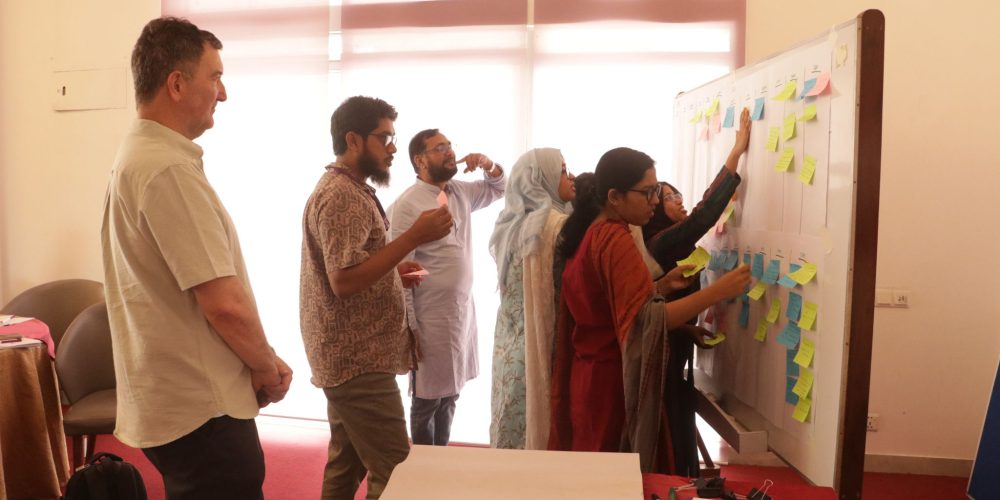Dhaka, Bangladesh — March 6, 2025
Ovibashi Karmi Unnayan Program (OKUP), in collaboration with CAFOD and Caritas Finland, hosted the Mid-Term Workshop of the Collective Action for Migrants’ Rights and Access to Justice (CLAIM) Project on 3–4 March 2025 at Aristocrat Resort, Purbachal. The two-day workshop brought together project staff, migrant forum representatives, and partners to take stock of progress over the last two years, identify challenges, and sharpen strategies for the next phases of the project.
The CLAIM project, now in its third year, works to empower women and girl migrant workers and their communities to resist unsafe migration, trafficking, forced labour, and exploitation, while ensuring access to justice and sustainable reintegration.
A Platform for Reflection and Strategy
Opening the workshop, OKUP and CAFOD facilitators outlined the event’s purpose — to review Years 1 and 2 achievements against the project’s objectives, assess the external context using PESTLER analysis, and use the Voice & Accountability (V&A) Tool to strengthen organizational and community advocacy capacity.
“This mid-term review is not just about looking back at what we have achieved, but about strengthening our strategies for the future,” said Philip Talman, Programme Officer for Bangladesh at CAFOD. “We want to ensure migrant voices are not just heard but have influence in decision-making.”
Key Progress and Impact
The review sessions highlighted notable achievements:
- Community Awareness: Thousands reached through door-to-door visits, courtyard meetings, and interactive theatre performances on migration rights and safe migration practices.
- Legal Aid and Justice: Dozens of arbitration cases resolved, helping migrants secure compensation and repatriation support.
- Migrant Forums: Grassroots structures with gender-sensitive representation have successfully engaged local government, addressed high migration costs, and intervened in trafficking cases.
- Policy Engagement: Contributions to government-led committees, including Counter Trafficking Committees (CTCs) and District Migration Coordination Committees (DMCCs), influencing migration law amendments and service delivery.
Voice & Accountability – Strengthening Migrant Forums
The V&A Tool assessment revealed that OKUP’s migrant forums are operating at Level 4 in Community & Constituency Building, meaning they play an active role in identifying issues and initiating solutions.
Richard Sloman, Country Program Representative for Bangladesh, Cambodia, and Myanmar at CAFOD, commended the progress:
“Your forums are raising concerns, organizing demonstrations, engaging in policy discussions — these are signs of maturity. But for Level 5, we need to see more self-reliance and leadership coming directly from the forums.”
Shakirul Islam, Chairperson of OKUP, echoed this:
“Our migrant forums have been the heartbeat of this project. They have shown resilience and solidarity, even during crises like COVID-19. But we must invest more in their capacity so they can stand independently and lead advocacy without depending on us.”
Understanding the Changing Context
A.A. Mamun, Programme Coordinator at OKUP, presented a detailed PESTLER analysis of the shifting political, economic, and social landscape affecting migration. Key findings included:
- Political instability and government restructuring disrupting services.
- Decline in labour migration opportunities due to market closures in Malaysia, Maldives, Oman, and UAE.
- Persistent challenges in regulating recruiting agency syndicates and sub-agents.
- Rising disinformation on social media promoting risky migration routes.
- Increasing climate-induced migration from vulnerable coastal regions.
Opportunities and Challenges
Group discussions identified several opportunities, such as leveraging the 2023 amendment to the Overseas Employment and Migrants Act (OEMA) to improve legal protections, using Union Digital Centers for outreach, and expanding issue-based social media campaigns.
However, challenges remain:
- Limited access to justice due to bureaucratic delays and missing documentation.
- Threats from middlemen to victims pursuing legal action.
- Financial constraints of migrant forums.
- Gender barriers for female migrants seeking legal support.
Looking Ahead – Plans for Years 3 and 4
The Year 3–4 plan includes:
- Launch of the “Access to Justice” Report in May 2025 with national and district-level consultations.
- Training for arbitration cell members and psychosocial counselors.
- Life skills and reintegration training for returnee migrants.
- Development of a formal advocacy strategy document to strengthen coordinated lobbying.
- An advocacy visit to Finland in June 2025 to engage policymakers, civil society, and international stakeholders.
Closing with Commitment
In his closing remarks, Omar Faruque Chowdhury, Executive Director of OKUP, emphasized the value of the long-standing partnership with CAFOD:
“CAFOD’s approach has been unique — they have allowed us the freedom to act independently, while opening doors to valuable networks such as the Ministry for Foreign Affairs of Finland. Even small community-level actions can lead to meaningful change, and we must keep building on this momentum.”
The workshop ended with a shared commitment to strengthen migrant-led advocacy, deepen government engagement, and ensure that migrants’ rights and access to justice remain at the centre of policy and practice in Bangladesh and beyond.


